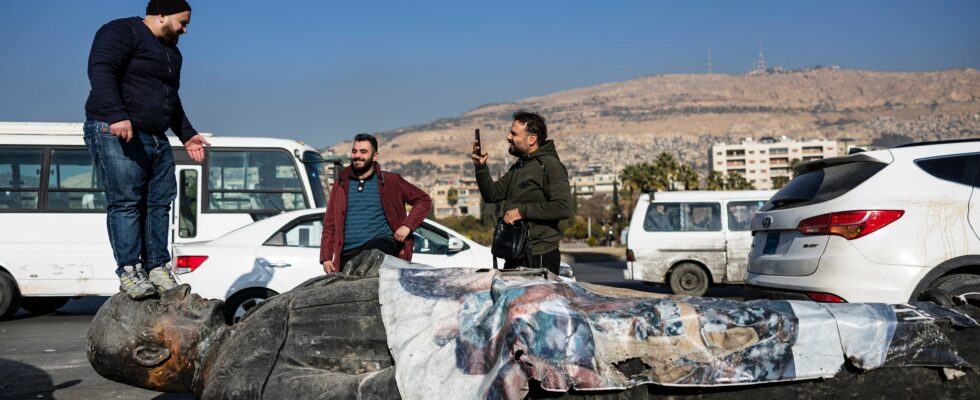Bashar al-Assad is in the headlines, his father Hafez much less. However, it is indeed the three bitter failures of the dynastic founder that translate and will embody the pitiful fall of the calamitous Bashar.
The Arab nation
Hafez el-Assad, “the lion”, seized power in Syria in 1970. He initially claimed to embody and strengthen al-watanthe homeland, and to make Syria the standard and leader of a united Arab world. In Syria in the 1990s, the face of the dictator in full cult of personality appeared everywhere and a map showing the entire Arab world under the shadow of a gigantic Syrian flag planted in Damascus! At the head of the secular pan-Arab nationalist Baath party, founded in 1945 in Lebanon, Assad rejects all competition, notably that of the other regional demiurge, Saddam Hussein; he will go so far as to join the American-UN coalition of 1991 against Iraq… When Bashar falls, the Baath is nothing more than an empty shell and Arab nationalism a specter that no force comes to support.
And for good reason: if it is in the name ofal-watan that Hafez claims to rule is to mask his favoritism for his own Alawite confessional community (around 10% of Syrians), a collective originating from Shiism and therefore despised by the Sunni majority. Not only did he place Alawites in all key positions, but this unbridled clanism is coupled with absolute nepotism illustrated by his dynastic succession (under a republican regime!) in favor of his younger brother Bachar, urgently recalled from London in 1994 to the death of his older brother Bassel. Only naive people and far-right activists still believe that the Assads “protected minorities”; they will only ever have promoted theirs…
Greater Syria
The notion of Bilad el-Sham, the country of Syriain the very broad and fluctuating sense of the term, overtaken by the Assads, includes both the sanjak of Alexandretta (ceded by mandatory France to Turkey in 1939) and the Israel/Palestine bloc, but also and above all independent Lebanon since 1943 and recognized as such by the UN. In 1976, Assad invaded the country of Cedar in civil war to “save” the Christians there. His regime will obviously abolish the embassy there, pillage its resources and assassinate a number of opponents, elected officials, intellectuals and French and American peacekeepers (with Hezbollah as accomplices), all to do so. only started again in 2005 under popular pressure. In March 2000, Assad also refused Clinton an Israeli peace plan offering him 98.5% of the Golan lost in 1967, an unexpected agreement given the balance of power! In 2024, all that remains of “Greater Syria” is the axis of four cities and a few coastal and desert acres, without Lebanon, the Golan, the Israel/Palestine bloc, beyond the Euphrates (Kurdish), Rojava ( Turkish) and even the Druze Jebel…
Palestine
Assad claims to make Palestine his priority, like so many other Arab despots before and after him, through the destruction of the “Zionist entity”. However, except in 1973 (to recover a Syrian area unrelated to the Palestinian territories!), he never attacked Israel frontally, and his son even less so. On the other hand, less dangerous, father and son will have successively oppressed the tiny Jewish community of Syria, martyred the Israeli prisoners of this Yom Kippur War, protected the Nazi assassin Alois Brunner, and widely spread anti-Semitism and negationism.
As for the Palestinians, the Syrians and their Hezbollah allies killed many, in Lebanon but also in Syria itself; in 2012, tens of thousands of Palestinians in Yarmouk, Damascus, were crushed under bombs. Hafez only supported the Saika, a minor and completely subservient Palestinian armed group. Who would have been surprised, since since 1993 he had condemned and fought the Israeli-Palestinian peace process in Oslo and its perspective of the two States, by supporting the Islamist Hamas against the moderate nationalist Palestinian Authority?
Ultimately, if Hafez had been at least a soldier and an activist who risked death, his offspring would have lived only in luxury and cowardice. Even more violent than his father, Bashar bore the name of a lion; he will have devoured and fled like a rat.
PS: To fully understand the Assad dictatorship, read absolutely A Pain to Liveby the Algerian writer Rachid Mimouni, and The Arab of the futureby Riad Sattouf.
Frédéric Encel, columnist at L’Express, author of a doctoral thesis on Jerusalem, published under the title “Geopolitics of Jerusalem” (Flammarion, 2009).
.
